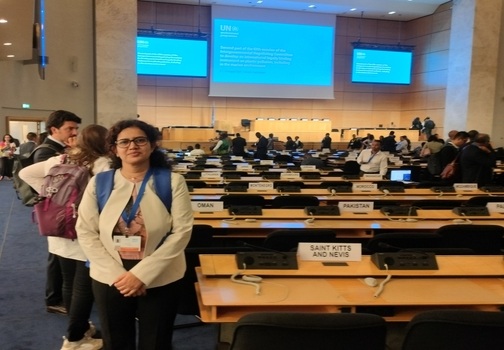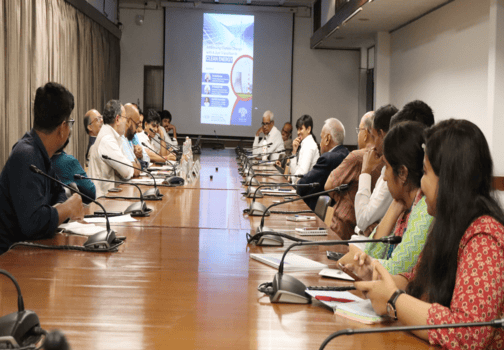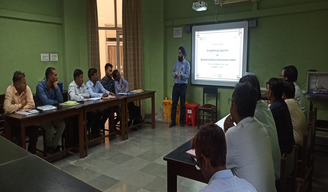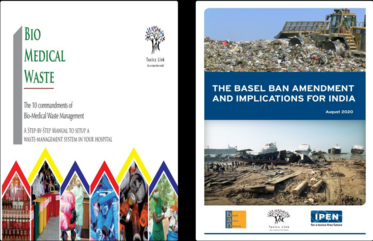Disposal of e-waste in the country
GOVERNMENT OF INDIA
MINISTRY OF ENVIRONMENT, FOREST AND CLIMATE CHANGE
RAJYA SABHA
UNSTARRED QUESTION NO. 1007
TO BE ANSWERED ON 10.02.2022
Disposal of e-waste in the country
1007. DR. VIKAS MAHATME:
Will the Minister of ENVIRONMENT, FOREST AND CLIMATE CHANGE be pleased to state:
(a) the percentage of e-waste disposed out of the total e-waste generated in the country
during the last three years, State-wise;
(b) steps that Government has taken to properly implement the E-Waste (Management)
Rules, 2016; and
(c) whether Government has any proposal to provide simple regulatory mechanisms, and
constant monitoring and regulation at certain intervals under the E-Waste
(Management) Rules, 2016, if so, the details thereof?
ANSWER
MINISTER OF STATE IN THE MINISTRY OF ENVIRONMENT, FOREST AND CLIMATE CHANGE
(SHRI ASHWINI KUMAR CHOUBEY)
(a) Under the E-Waste (Management) Rules, 2016, twenty-one (21) types of electrical
and electronic equipment (EEE) have been notified. These notified EEE at the end of their
life becomes E-Waste. The input data for estimation of generation of e-waste is available
only from FY 2017 – 18 and for national level generation only.The percentage of e-waste
collected, dismantled & recycled/ disposed out of the total e-waste generated in the country
from twenty-one (21) types of EEE notified under the said rules during the last three years is
given below:
|
Financial Year Generation Quantity of e-waste collected, dismantled |
|
& recycled / disposed |
|
(Tonnes) (Tonnes) (%) |
|
2017-18 7 ,08,445.00 69,414.0 9.79 |
|
2018-19 7,71,215.00 1,64,663.0 21.35 |
|
2019-20 10,14,961.21 2,24,041.0 22.07 |
(b) & (c) Following Steps have been taken by the government for effectiv
(b) & (c) Following Steps have been taken by the government for effective
implementation of the E-Waste (Management) Rules, 2016 and constant monitoring
under the said rules:
- Implementation Guidelines for E-Waste (Management) Rules, 2016 comprising of
nine (9) specific guidelines have been prepared and uploaded on the web site of
Central Pollution Control Board (CPCB).
- Guidelines for Producer Responsibility Organizations (PRO) have been prepared
and uploaded on the web site of CPCB.
iii. The guidelines for environmental compensation charges (ECC) under e-waste
rules have been prepared in December, 2020.
- An Action Plan is in place for enforcement of the e-waste rules in the country, and
is being implemented through State Pollution Control Boards (SPCBs)/ Pollution
Control Committees (PCCs). SPCBs/PCCs are submitting quarterly progress
report as envisaged in the Action Plan through a web portal developed for this
purpose.
- CPCB through SPCBs/PCCs has established a system of continuous verification of
the producer’s system of collection and verification of their compliance including
collection target. The SPCBs/PCCSs also has to continuously verify the
dismantlers and recyclers of e-waste. SPCBs/ PCCs are required to submit their
quarterly progress report trough a web portal in the system.
- There are 468 authorised Dismantlers/Recyclers in 22 States/UTs having
processing capacity of 13,85,932.22tonnes.
vii. Standard Operating Procedure (SoP) for grant of Extended Producer Responsibility
Authorisation (EPRA) under E-Waste (Management) Rules, 2016 has been
prepared for applicant where guidance has been provided for how to fill up
applications.
viii. Monitoring mechanisms for effective implementation of the e-waste Rules are
detailed below:
Annual and Quarterly returns fromExtended Producer Responsibility(EPR)
authorized Producers.
Annual Returns from PROs.
Annual returns from authorized Manufacturers, Dismantlers, Recyclers,
Refurbishers, Bulk Consumers to concerned SPCBs/PCCs.
Annual Report from SPCBs/PCCs to CPCB.
Annual Review Report from CPCB to MoEF&CC.
Random verifications of dismantler/ recyclers to ensure compliance of CPCB
guidelines.
Random inspection of EPRA producers (Collection centres) to ensure
compliance of EPR conditions.






